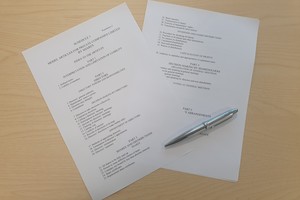Here is a story written by one of our clients who sustained an acquired brain injury as a result of a catastrophic road traffic accident in which he was the driver. We would like to thank him for sharing this story.
Many people visibly have had head injuries; they might be wheelchair bound or wear head protection because they suffer from seizures. However, the majority of us have few, if any, physical signs of head injury. There are no bandages or braces - in my case I have two scars on my scalp and a pair of glasses, so it’s not obvious I’ve had trauma.
I guess the question is ‘what do people not see?’ With me it’s mainly; tiredness, slowness, irritation, incontinence, visual impairment and confusion - although these are often quite evident. Early on it was hard to find a simple way to describe effects so that people understood, plus I didn’t fully understand them myself for a while! Then a doctor summed it up in a way that I noted and have used ever since: ‘You’re like an old laptop; the hard drive is there but the processing speed is slow, like the circle going around on the screen, and the battery runs out quickly’.
It’s not clearly visible how processing is slower than before. At times I can unintentionally ‘switch off’ and not take in what people are telling me. I may sometimes feel a little overwhelmed, particularly when rushed and I’m normally slow to make decisions. It’s rather like being a duck on a pond; things might appear calm above the water, but the legs are going like crazy underneath. For example, it’s taken me an age to write this, whereas prior to brain injury I’d have it written in very little time at all. There are also more nuanced effects; I regularly interpret things more literally now and can present as confused and/or irritated when trying to process what I’m told. Besides that, I often apologise because I’m anxious about making mistakes or being rude without realising. I usually ask my partner if I said anything insulting after meeting friends.
I spend a staggering length of time hidden away resting, or ‘recharging’ as I now call it. My level of tiredness is crucially important and there’s various things that influence it. Typically, when I’m fatigued, I struggle to find words or remember recent things, I wet the bed and sometimes I just feel totally wiped out. I was quite dismissive of fatigue for a time because life since trauma has much less activity in it compared to before, but this is the wrong comparison to make and I’ve come to respect it the hard way. I can do things that appear quite normal if I’m not tired and people instinctively look for the positives in that, but out of sight afterwards come the hidden effects of tiredness. Other than me, there’s only my partner who truly understands the exact nature of my fatigue and I do my best not to be a burden by ‘recharging’.
I’ve had supportive input from health professionals regarding how to manage daily life so it functions as well as it can. The best advice is around reminder strategies and to keep life short and simple whenever possible. This might appear to others like I avoid meeting or making phone calls, but I’m attempting to maintain my battery charge by spacing things out and pacing myself so I can present as well as possible. Forcing myself is in effect punishing myself and I’ve accepted that short and simple is the right approach. Occasionally I’m unsure why I’m very tired, but should I get into real difficulty I’ve been given a head injury card that’s recognised by authorities nationwide, like the police, otherwise they might think I was drunk. If I were to lead a full ‘normal’ life, then the effects wouldn’t be ‘hidden’ for very long.
The degree of impact from tiredness is a troublesome thing for friends and family to get to grips with. Imagine a situation where you meet a friend on Wednesday morning and feel okay. Then you meet another friend on Wednesday afternoon, but struggle because you overdid it on Wednesday morning and really should rest. Then both friends meet up on Friday and naturally disagree as to how you are doing because they don’t realise that your presentation reflects your level of tiredness.
When asked, I usually just stick to the headline of ‘I had a bang on the head’, or ‘I had a fractured skull’, or ‘I had a bleed on the brain’. To an extent, people’s lack of understanding in my case is partly because I rarely share the full range of my head injuries; I don’t want to be continually harping on about them, it’s still emotional and even if I told people, it’s unlikely they would know what several of the other injuries actually are. I’d probably feel too pressured or emotional to explain the details correctly and answer any follow-up questions. Some friends would possibly be interested in knowing about the whole set of head injuries, but I’d find this stressful and intrusive. I’ll make an exception here to give an example of one that I rarely share and why: My sight issue is actually mostly a result of brain trauma, but I almost always say ‘my eyes’ rather than ‘my 4th cranial (trochlear) nerve palsy’. It would irritate me having the pressure of explaining what this is and why it won’t resolve in my case. Frustratingly, I can’t remember why it won’t resolve itself, nor why prisms won’t work. I’ll have it written down somewhere for reference, but it ironically demonstrates one of the hidden issues by not searching for it!
My vision is also affected by levels of activity and I need to take things steady for my sight to function without more double vision than is necessary. It changes regularly, things can look one way at 9am and quite different by 9pm. Each day begins with the process of bringing images together. This is obviously hidden - when people ask ‘what are you doing tomorrow’, you don’t say ‘well I’ll bring images together and then…’
There are challenges that are somewhat annoying, but not always visibly evident and hopefully this has lifted the mist a little.
Last year Fran Ibson and Donna Forrester assisted this client with providing holistic rehabilitation support together with legal help. To find out more call 01482 316756.


















